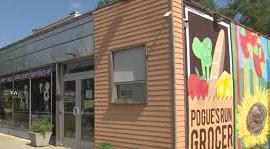Gratitude and Loss

While assembling this issue of Cooperative Grocer, I’ve been reading, rereading, and reflecting on its contents. I hope you will put the magazine to use and do the same, especially as you consider our many-faceted theme: diversity, equity, and inclusion.
At the same time, I’ve been reading Catalog of Unabashed Gratitude, a remarkable book of poetry by Ross Gay, someone who lives in Bloomington, Indiana (where I live), teaching at the university here. I know him through the food co-op, Bloomingfoods, and its connections with Mother Hubbard’s Cupboard, a resource founded in 1998 by two mothers who had experienced poverty firsthand. As this non-profit explains at its website (mhcfoodpantry.org) MHC was “intentionally designed with a focus on health, choice, and respect” with a mission “to increase access to healthy food for all people in need in ways that cultivate dignity, self-sufficiency, and community.”
Ross Gay is also a founding board member of the Bloomington Community Orchard, described by him as “a non-profit, free-fruit-for-all food justice and joy project.” In the title poem of Catalog, he describes how he and fellow volunteers “dreamt an orchard this way, /furrowing our brows,/and hauling our wheelbarrows,/and sweating through our shirts.” In the final words of his book, Gay acknowledges the Orchard as “the ground from which so many of these poems grow,” thanking “the family that place has grown to be.” His writing serves as a deep dive into how it might feel, in a visceral way, to work together on such an unabashedly hopeful project.
But, as LaDonna Redmond-Sanders observes in her article for this issue, “the journey is not easy.” The work of paying attention to diversity, equity, and inclusion is as demanding as anything else we do in our efforts to nourish and sustain vital communities by means of our stores. It is difficult because of the inequities that exist, the blindspots we have concerning them, and the many obstacles thrown up by social systems entrenched with racism, sexism, and economic injustice.
Because this work is so demanding, we need to see it as foundational: it’s part of the very ground of our efforts. To quote Redmond-Sanders again: “This is not extra work. It is the work.” That may seem strange if we are focused only on the numbers and the smokescreen of their abstract demands (as in, for example, “the numbers indicate that we have to cut labor”).
To address diversity, equity, and inclusion in a meaningful, impactful way, we need to examine culture in all of its messy complexity, rolling up our sleeves to engage with others, mustering both pride and humility. This is difficult cultural labor, because—as LaDonna reminds us—“Culture eats strategy for breakfast.”
There’s another story that’s been haunting me as we prepared this issue, a situation we haven’t yet covered here. Even as we were working with Stuart Reid to think about the wave of startup food co-op projects in urban communities, Pogue’s Run Grocer in Indianapolis closed its doors. While this co-op had existed since 2010, bringing groceries to an eastside area of Indianapolis underserved by supermarkets, it closed on Monday, June 18 “because of falling sales,” according to a short account in The Indy Star.
As is so often the case, an Internet search produces a deeper story, one that reveals the extent to which the internal culture of the board and staff was in need of mediation. Whatever conclusions any of us might draw about the conflicts that “ate strategy for breakfast” at Pogue’s Run, the example stands as verification of the need to work together in advance to avoid other such painful situations. What can we do, moving forward, to ensure that part of this co-op’s legacy is our collective determination to learn from its demise?
One common goal, if we abide by cooperative principles and values, must be aligned with that of Mother Hubbard’s Cupboard: “to increase access to healthy food for all people in need in ways that cultivate dignity, self-sufficiency, and community.” Let’s keep digging in. •
Ellen Michel is executive director of Cooperative Grocer Network and managing editor of Cooperative Grocer magazine. [email protected]







